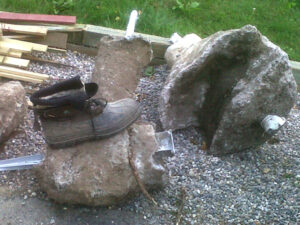FAQ's
In the Fence Repair business, we find there are a number of questions people ask. Here are some of the most common ones and answers that we’re sure will help:
Contact Steve today for your fencing needs!
1) Why are some of my wooden posts compromised (leaning) and some aren’t?
There can be several reasons why this happens. The most common one is that the post has a bad footing, eg. the post was not set 3 feet deep in the ground with concrete up to the top of the hole. If the post is only surrounded by dirt it will deteriorate. Most people think cement is only an anchor for the post, but it also provides a protective barrier for it. Other things that can compromise posts include:
- The post is exposed to a lot of water, whether above or below the ground.
- It was a flawed post to begin with - cracked, twisted, warped, or too many knots too close to ground level.
- Hanging heavy flower pots on the posts.
- Fence posts are not designed to have 20 lbs. or more hanging on one side of them. This can cause them to lean in a short time.
- Posts that are on the sides of hills. These tend to lean more since there's more support on one side than the other.
2) Why doesn’t my gate/gates close properly any more?
Gates can be the biggest headache of all. The post that the gate is hinged to is especially susceptible. The gate is the only part of the fence which moves (swings) and that puts a lot of pressure on the post, causing it to lean toward the other gate post. Wooden gates can be very heavy, which tends to pull the post out of alignment. Also, wood has a grain and the posts tend to twist one way in the summer and one way in the winter. To prevent this, when possible, putting a board between the posts at the top will help keep your gate working smoothly.
Chain link fence gates can have their own problems, with the nuts and bolts becoming loose, so the latch doesn’t line up any more. As well, improperly installed posts can heave and twist, causing further problems.
A rule of thumb for all gates is to make them as light as possible and no more than 42 inches wide. If you need a wider opening, you should use a double gate.
3) Do the metal post holders that you pound into the ground to hold up the wooden posts work well?
I personally think metal post holders should only be used if your fence is no more than 3 feet high. Try holding a baseball bat straight up and down by only the bottom 2 inches and see how long you can keep it like that. A customer of mine had a fence that someone installed using metal post holders. After only a year each post was leaning in different directions. They had me take it down and start from scratch, which cost them much more in the long run.
4) Why don’t the 2x4's at the top of my fence span the distance between the posts anymore?
It always amazes me how quickly pressure treated wood shrinks in the sun. P.T. wood is usually very wet when you buy it, no matter where you get it from. The 2x4's at the top of your fence (especially the ones holding lattice) are constantly exposed to direct sunlight, so they can shrink 3 inches or more in length after only a few summers. It’s also the reason that 1x6 fence boards get such big spaces between them in just a few weeks.
5) Why is it so expensive when I need to have the concrete footings removed to repair or replace my fence?
 It takes a lot of time and work to remove footings from the ground.
It takes a lot of time and work to remove footings from the ground.
They have to be dug out and concrete is very heavy. The concrete is often poured into holes unevenly, making it even more difficult to get them out. Once removed, they have to be disposed of, which can be costly because of the weight of them.
6) How long can I expect my fence to last?
Wooden fences should last for many years, if built correctly and maintained properly. The type of wood used can be a factor in the longevity of your fence. For example, cedar is such a soft wood that you must stain both sides of your fence to keep it from deteriorating too quickly. In this region there are thousands of fences that were built in the 70's and 80's, which makes them 35 to 45 years old - a ripe old age for a fence. When your fence has been around that long, you can expect it to need some repair work done.
Chain link fences can last twice as long as wooden ones, but don’t look as nice or offer much privacy. However, the cost savings make it an appealing choice in some locations and applications.
Just remember that a fence is only as good as the posts it is set in. Especially in Canada, where FROST is a post’s worst enemy!! Good footings, good wood ... good fence. And if not - Mr. Good Fence Repair.
You can check this article by Family Life Share here for more answers to questions about backyard fences.
I hope that this information has been helpful. I’m more than willing to answer any and all questions about fences that you might have. Please feel free to contact me for further information and a free quote.
Thank you, Steve Good (Owner and operator)
